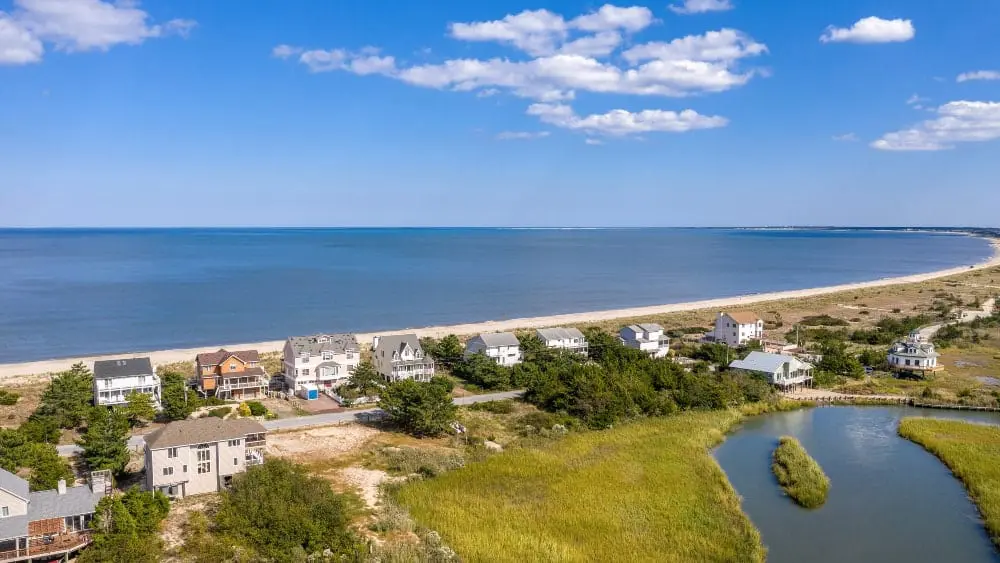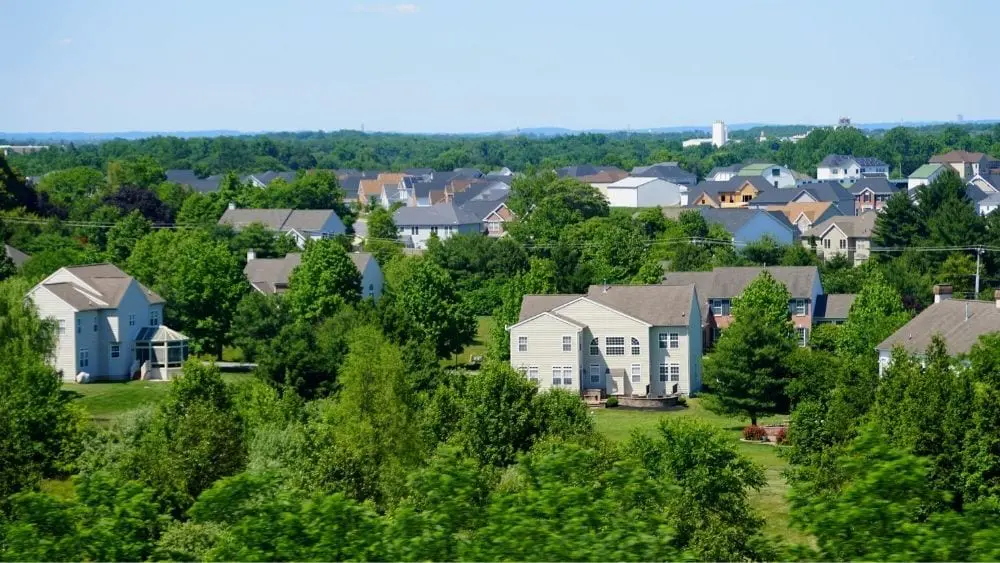
Whether you already live in Wilmington or Rehoboth or plan to move to Delaware, building a new home there will cost more than it does in many other states. According to GoBankingRates, the step-by-step process to build a home in Delaware costs an average of $231,060, which is the fifth-highest average cost to build a house in the United States. Labor costs in Delaware are about half the cost in other states at an estimated $16.57 an hour, but land costs are high in the state.
Numerous factors impact the cost to build a house in Delaware, including the location within the state, the size of the lot, the size and style of the house, and the materials you choose. The cost is likely to be higher in an urban area like Wilmington and in some of the beach resorts on the Delaware coast than it will be in more rural areas of the state.
Custom vs. Production Homes
An important distinction that also impacts the average cost to build a house in Delaware is whether you’re building a custom home or what’s called a “production” home. A production home refers to a house designed and built by a builder within a community or a small cluster of homes. Depending on the builder, you may have numerous options for personalizing your home, be able to choose between packages of finishes and features, or have few choices to make.
Typically, you pay one fee for a production home that includes the lot, the house, and optional choices. Sometimes you’ll pay extra for a specific lot or special features. The permits, architectural design, materials, and labor are all included.
When you build a custom home, many of those costs are paid separately. The price varies greatly according to whether you need to install infrastructure, hire an architect, and buy the land.
In this article, we’re talking about how to build a production home in Delaware.
Step-by-Step Process to Build a House in Delaware

From start to finish, it typically takes about seven months to build a house in Delaware. The timeline depends on your builder and whether the lot is ready for construction to begin.
The following steps outline the process to build a home in Delaware.
1. Budget for your new home
While you’re probably eager to jump into the phase of looking at model homes and choosing your finishes and fixtures, your first step before you start to build a house in Delaware is to develop a financial plan. You’ll need a solid understanding of how much you are comfortable paying on a monthly basis for your mortgage, taxes, insurance, and homeowner association dues. You need to know how much cash you have saved for a down payment, closing costs, and moving expenses and an idea of how much profit you will generate if you have a home to sell. All this information can help you establish a budget to build a house in Delaware.
Once you have a budget in mind, you can consult a lender to obtain preapproval for a mortgage. A lender can identify any credit issues that need to be fixed and tell you the maximum you qualify to borrow. Even when you have a preapproval letter in hand, you can always switch to a different lender if want to work with someone else later.
The price per square foot to build a house in Delaware averages $110 to $230, which would be $275,000 to $575,000 for a 2,500-square-foot house. Generally, materials represent 50 percent and labor costs range from 30 percent to 40 percent of the total cost when you build a house in Delaware. Other costs include permits and inspections.
You may have options available for the materials used for the exterior and interior of your home. If you do, that could save you some money. Also, production builders can often buy materials and appliances in bulk, which can reduce costs.
Lumber costs can be a major part of the cost to build a house in Delaware, ranging from $25,000 to $65,000. The roof is also a costly part of the house, ranging from $5,000 to $11,000 or more depending on the material and style. Inside, your costs depend on the choices made by you or your builder for appliances, lighting, flooring, counters, paint, and fixtures.
Most production homes are built within a homeowner association or HOA. How much you will pay in HOA dues depends on the size of the community and its amenities.
Homeowner’s insurance in Delaware costs an average of $1,521 per year, according to Insurance.com, which is among the lowest rates in the country and well below the national average of $2,305.
Property taxes are also lower in Delaware than in most other states, at an effective rate of 0.56 percent compared to a national average of 1.07 percent. The property tax bill on a $200,000 home in Delaware is $1,120 annually.
2. Choose your builder and community

Once you have an estimate of your price range, you can more easily narrow your choice of builders. Typically, it’s easiest to start online and look at communities and builders by price range and location. Many communities have multiple builders, so you’ll want to explore their websites to gather information and check out floor plans, photos, and renderings. You can check builder reviews at TrustBuilder®.
Next, visit model homes and get a feel for each community. You can ask sales professionals on-site about plans and ask residents about their experience with the community and the builder.
3. Line up your financing
After you identify the builder and community you want, you’ll need to complete the financing process. Many builders have a list of preferred lenders and title companies that they encourage their buyers to work with for a streamlined process so they are confident the transaction will be completed. Some larger builders even have an in-house lender. It’s smart to apply for a loan with the preferred or in-house lender because of their commitment to the builder to close each deal. In addition, some builders offer incentives to work with their preferred lender, such as paying closing costs or for an upgrade.
You’ll need to make a deposit when you sign the contract to build a house in Delaware. This would be a good time to look for state and local homebuyer programs to see if you qualify for down payment assistance in Delaware.
The down payment will be made at the closing when your home is complete, but you may need to pay cash for any unusual upgrades in some cases. Getting your funds for the closing in one place well before the house is complete can make for an easier transaction. Closing costs generally cost 2 percent to 5 percent of the home price, but sometimes builders cover some or all of those costs.
4. Choose your lot and your floor plan

With the builder, community, and financing in place, it’s time to pick your lot and your floor plan. The sales representative on-site can provide insight during this important step in the process of building a home in Delaware. Your lot and floor plan need to be matched. In some cases, the floor plan you want may not fit on the lot you want or can’t be built there because of restrictions on the number of homes that can be built with the same design or exterior.
Ask your sales representative about plans for the community that could impact the desirability of each lot, such as sites for future retail, schools, or homes.
Be sure you know which structural configurations and features are included and which are optional before you make your final decision.
5. Be aware of permitting and inspections
In Delaware, building codes are mandated by county and local jurisdictions, but the state has adopted energy conservation, mechanical, plumbing, and fuel gas code requirements that all builders must meet. Your builder will also take care of the permitting process when you build a production home in Delaware and will arrange for all inspections. You can also hire your own inspector. If you do, you should ask your builder about the best time for that inspection.
6. Consider the local climate
Delaware’s coastal areas face threats from rising sea levels, flooding, and storms. You and your builder may want to discuss design choices or materials that can help your new home be more resistant to wind, rain, and floods.
Construction Period

The step-by-step process to build a house in Delaware can be shorter or longer depending on numerous factors such as the weather, the availability of labor and supplies, the size and style of your home, and even how long it takes to get permits and inspections. Stay in touch with your builder throughout the process to check on progress and with your lender to make sure your financing is ready when your new Delaware home is complete.

Michele Lerner is an award-winning freelance writer, editor and author who has been writing about real estate, personal finance and business topics for more than two decades.
 The Top 9 Best Places to Live in Illinois
The Top 9 Best Places to Live in Illinois